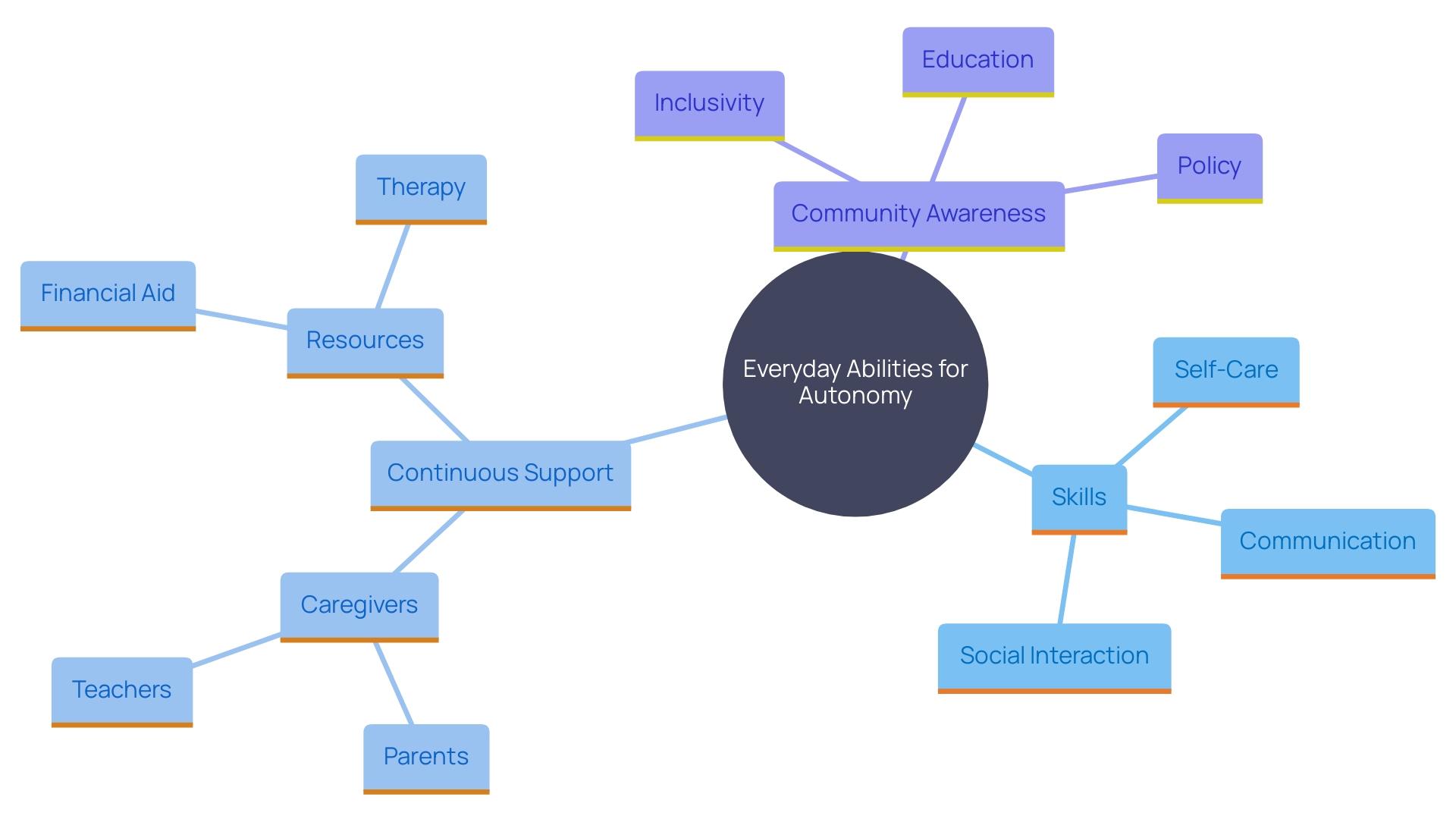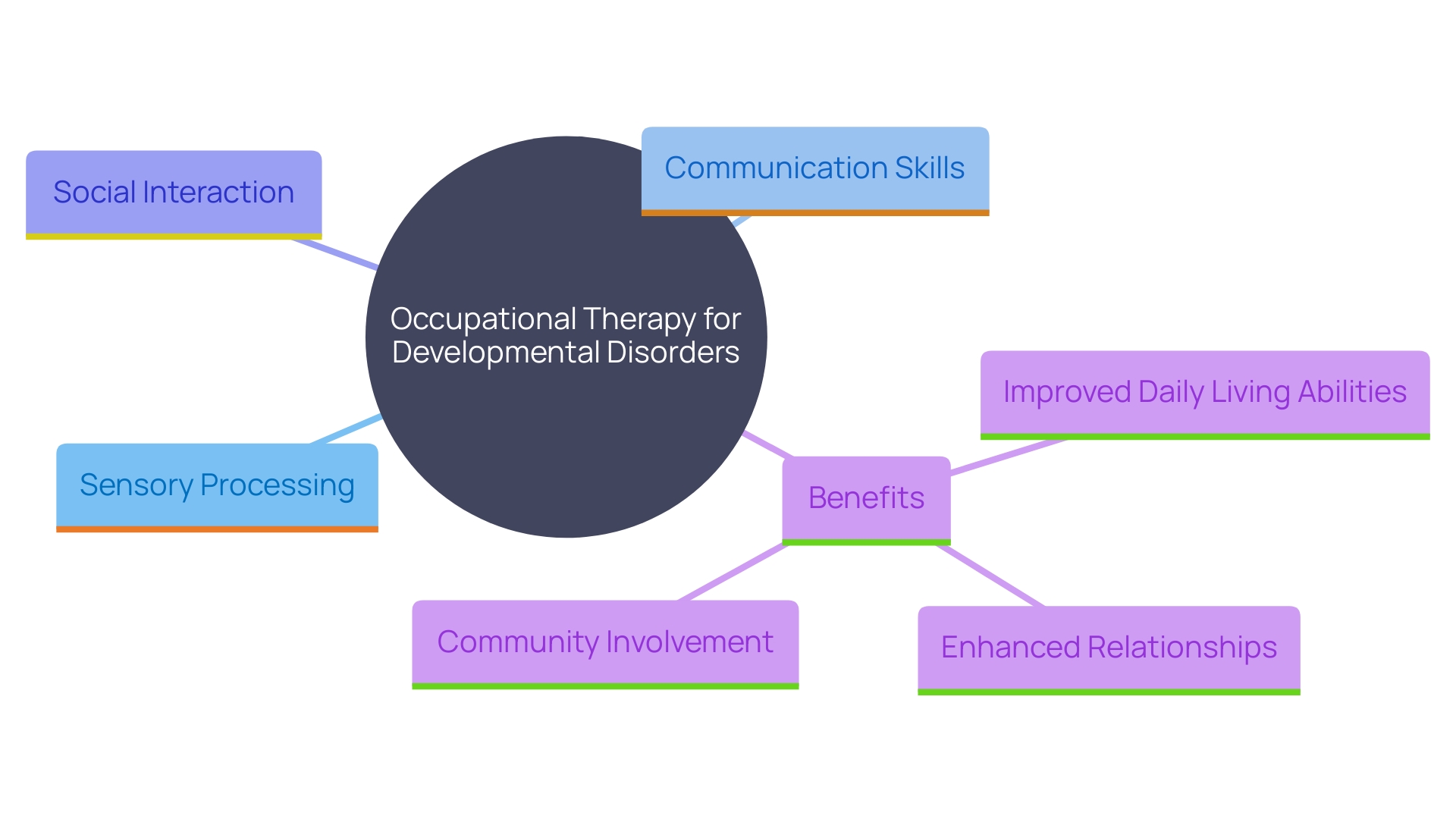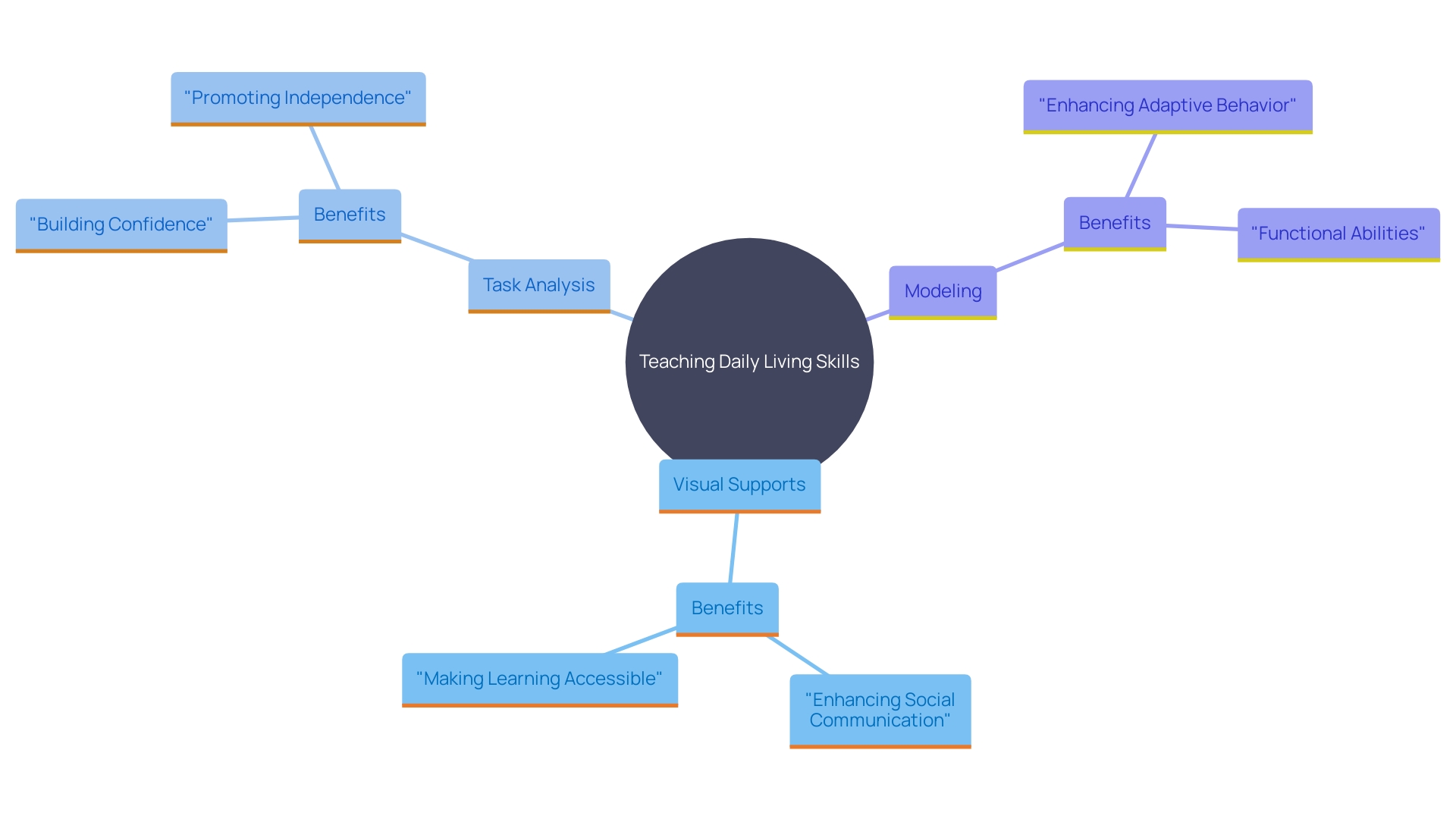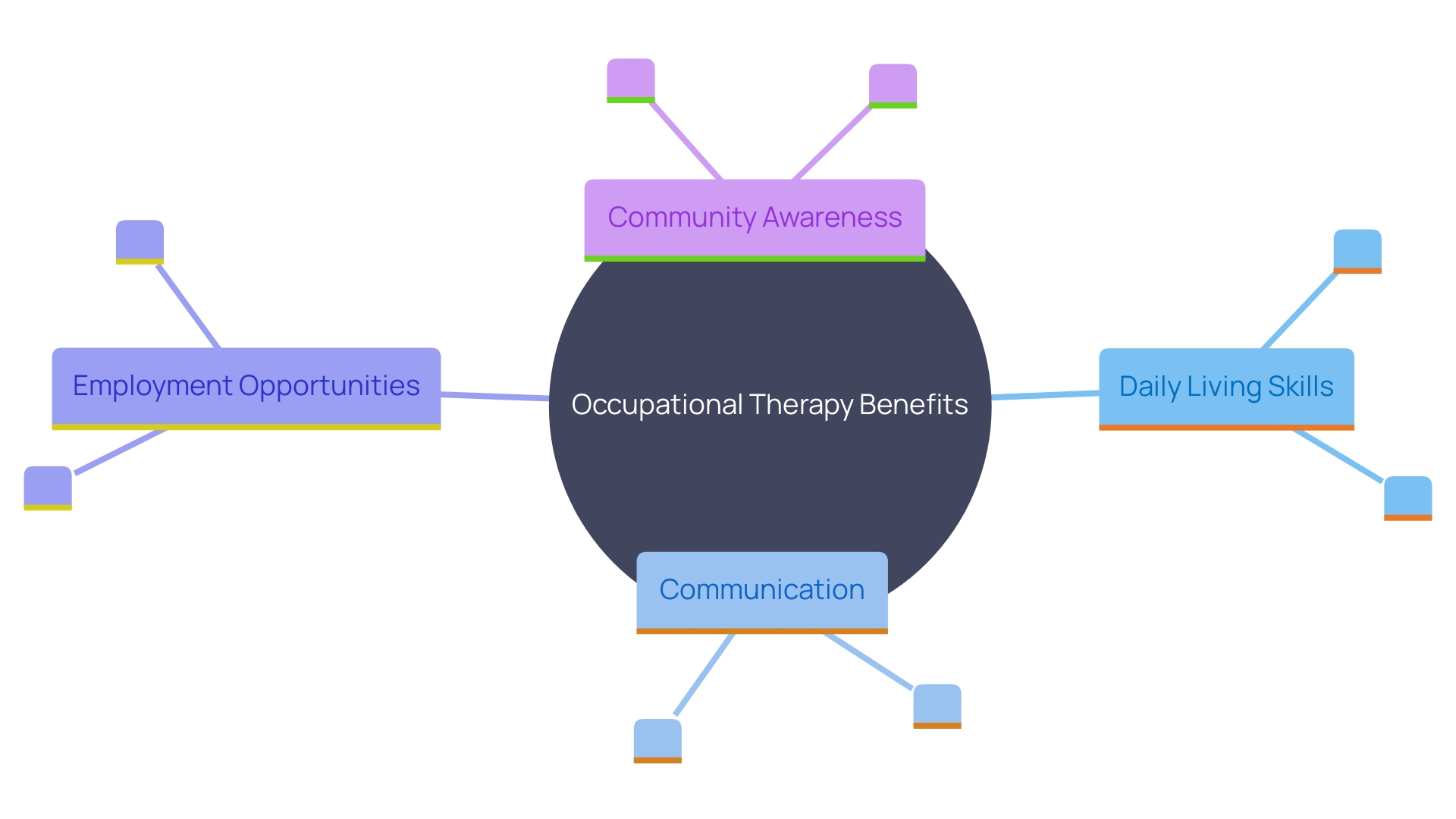Introduction
Understanding the importance of daily living skills for individuals with autism is crucial for fostering independence and self-sufficiency. These essential activities encompass personal hygiene, meal preparation, and money management, all of which significantly enhance the quality of life and community engagement for those on the autism spectrum. Mastering these skills not only builds confidence and reduces anxiety but also enables smoother navigation through various environments.
Research indicates that daily living skills tend to improve during adolescence and early adulthood. However, they may plateau by the mid-to-late 20s and potentially decline in later years, highlighting the need for continuous support and tailored interventions throughout an individual's life. Early, developmentally appropriate interventions, particularly for toddlers showing early signs of autism, have proven effective in addressing core social difficulties and providing families with essential support.
Community awareness and acceptance of neurodiversity are paramount. Autism should not be seen as something to be fixed or cured, but rather as a unique aspect of an individual's identity. By fostering inclusive environments and raising awareness, society can ensure that autistic individuals not only participate but thrive in their communities.
Understanding the Importance of Daily Living Skills
Everyday abilities are essential for promoting autonomy and self-reliance in persons with developmental disorders. These abilities encompass a range of vital tasks such as personal hygiene, meal preparation, and money management. Acquiring these abilities not only improves the quality of life for people on the autism spectrum but also enables them to participate more actively in their communities. Cultivating expertise in everyday activities enhances self-assurance and diminishes stress, enabling people to move through diverse settings with increased comfort.
Research indicates that these skills tend to improve throughout adolescence and early adulthood but may plateau in the mid-to-late 20s, with some decline observed in later years. This underscores the importance of continuous support and tailored interventions that address the unique needs of autistic individuals across their lifespan.
A case study highlighted the effectiveness of early, developmentally appropriate interventions for toddlers showing early signs of autism. These interventions, which focus on core social difficulties, empower families and improve accessibility to necessary support. Furthermore, cultivating a setting that recognizes neurodiversity and offers support for caregivers is crucial for the mental health and well-being of autistic people.
The significance of community awareness and the necessity for a deeper comprehension that this condition is not something to be repaired or remedied cannot be overstated. By raising awareness and making changes to support safe participation, we can ensure that autistic people are not only included but are also able to thrive in their communities. As Dr. Nicole Sharp, an occupational therapist, emphasizes, recognizing the value of neurodiversity is vital for creating inclusive and supportive environments.

Key Areas of Focus in Occupational Therapy for Autism
Occupational therapy for people with developmental disorders emphasizes crucial areas such as sensory processing, communication, and social interaction to enhance daily living abilities efficiently. Therapists collaborate to recognize and address sensory sensitivities, assisting people in developing coping strategies for overwhelming stimuli. Enhancing communication skills is crucial, as it enables individuals to express their needs more clearly, addressing a core challenge associated with autism. Evidence indicates that developmental interventions significantly enhance communication skills, particularly with caregivers, resulting in improved interactions and relationships.
By focusing on interpersonal interaction, therapists aim to foster improved relationships and community involvement, essential for overall well-being. The significance of community interaction is further backed by naturalistic developmental behavioral interventions, which considerably affect adaptive behavior, play, and language. These interventions assist individuals on the spectrum in navigating social environments more comfortably, fostering independence and confidence.
One inspiring example features an 11-year-old girl with anxiety and greater support requirements on the neurodevelopmental spectrum. Through focused occupational therapy and parental instruction, she achieved remarkable progress in managing her sensory sensitivities and enhancing her communication abilities. This case emphasizes the significant effect occupational therapy can have on people with developmental disorders, establishing a strong basis for effective daily living and lasting favorable results.

Strategies for Teaching Daily Living Skills
Effective strategies for teaching daily living skills to persons with autism include the use of visual supports, task analysis, and modeling. Visual supports such as schedules and checklists offer clear guidance and structure, making tasks more manageable. This approach is particularly beneficial as it enhances social communication and adaptive behavior, essential aspects often targeted in developmental interventions.
Task analysis, which breaks down complex activities into smaller, achievable steps, enables learners to progress at their own pace. This method has been shown to improve various domains, including play and language, by making learning more accessible and less overwhelming.
Modeling entails showcasing a skill before inviting the person to attempt it on their own, offering a clear illustration of the anticipated result. This technique not only clarifies the task but also builds confidence in the learner. By incorporating these strategies into therapy sessions, learning becomes engaging and customized to the person's unique needs, promoting greater independence and functional abilities.
Research supports the efficacy of these methods. For example, a study at The Center for Discovery emphasized the application of AI and machine learning to forecast and handle significant behaviors in people on the autism spectrum, showcasing the importance of structured and data-driven strategies. 'Moreover, early intervention approaches such as the Early Start Denver Model (ESDM) incorporate play, interpersonal exchanges, and mutual focus to improve language and interpersonal abilities in natural environments, highlighting the importance of customized, developmentally suitable strategies.

Benefits of Occupational Therapy for Individuals with Autism
Occupational therapy offers profound and far-reaching benefits for individuals with autism, focusing on enhancing daily living skills. This approach not only promotes independence but also fosters self-confidence, enabling greater participation in community and family activities. By reducing frustration and reliance on caregivers, occupational therapy can significantly improve the overall family dynamic.
Research shows that developmental interventions, including those employed in occupational therapy, enhance communication and adaptive behavior. For example, naturalistic developmental behavioral interventions have demonstrated positive effects on communication, with significant improvements observed in various areas such as language and play.
Moreover, occupational therapy provides people with essential life skills that are crucial for future employment opportunities and social engagements. Although just 21% of individuals with disabilities, including those with developmental disorders, were employed in 2022, there is an increasing acknowledgment of the economic advantages of inclusive employment. Companies that actively seek to hire people with disabilities often outperform those that do not, with higher revenues, net income, and profit margins, suggesting a significant boost to the U.S. GDP if more workers with disabilities joined the labor force.
Dr. Nicole Sharp, an occupational therapist, stresses the significance of community awareness, asserting, "There is also a need for greater community awareness of the fact that this condition is not something to be fixed or cured." Promoting understanding and accepting neurodiversity can foster a more inclusive atmosphere, aiding the effective incorporation of people on the autism spectrum into different areas of life.
In conclusion, occupational therapy plays a pivotal role in empowering individuals with autism, enhancing their functional abilities, and preparing them for a more independent and fulfilling life.

Conclusion
Daily living skills are essential for fostering independence in individuals with autism. Mastering skills such as personal hygiene, meal preparation, and money management enhances quality of life and promotes community engagement. Continuous support and tailored interventions are critical, especially as skills may plateau or decline in later years.
Early interventions have proven effective in addressing core social challenges and providing families with necessary resources.
Occupational therapy is pivotal in developing these skills, focusing on sensory processing, communication, and social interaction. Strategies like visual supports, task analysis, and modeling create engaging learning experiences tailored to individual needs. These approaches not only improve functional abilities but also build confidence, enabling individuals to navigate social settings more effectively.
Community awareness and acceptance of neurodiversity are crucial for creating inclusive environments where autistic individuals can thrive. Recognizing autism as a unique aspect of identity rather than something to be fixed fosters understanding and support. Embracing neurodiversity can lead to significant improvements in the lives of individuals with autism, facilitating their participation in community and workforce settings.
In summary, the journey toward independence for individuals with autism requires collaboration, awareness, and tailored strategies. By prioritizing daily living skills and fostering supportive environments, society can empower autistic individuals to lead fulfilling lives, ensuring they not only participate but also thrive in their communities.




